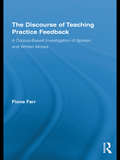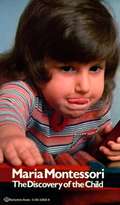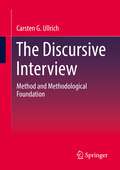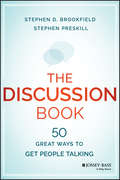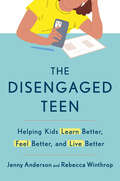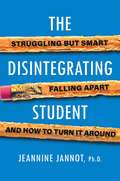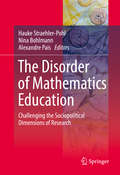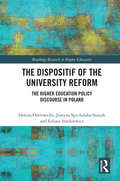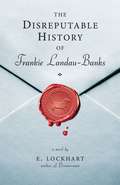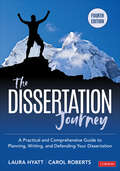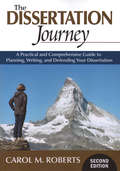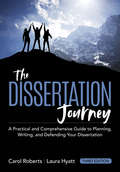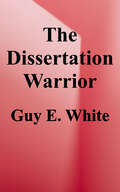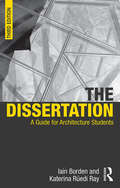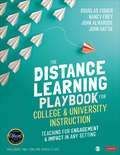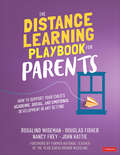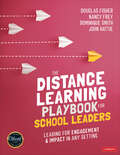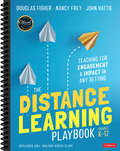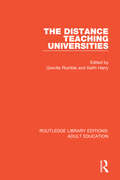- Table View
- List View
The Discourse of Teaching Practice Feedback: A Corpus-Based Investigation of Spoken and Written Modes (Routledge Advances In Corpus Linguistics Ser. #12)
by Fiona FarrIn this book, Farr examines the spoken and written language of post-observation teaching-practice feedback on teacher education programs. To do so, she draws upon theories from discourse analysis, conversation analysis, and pragmatics to frame the analysis of feedback meetings and written tutor reports, which are then examined using comparative quantitative and qualitative corpus-based techniques. The overall aim is to determine the defining characteristics of this genre, focusing especially on pragmatic factors, with the ultimate goal of investigating the salient aspects responsible for making feedback both effective and affective. Farr's research draws upon a spoken corpus of feedback interactions and a written corpus of tutor reports from language teacher education and is also strongly informed by data in the form of diary reflections and questionnaire responses from student teachers and questionnaire responses from the relevant tutors.
The Discovery Of The Child
by María MontessoriMaria Montessori went beyond the conventions of the day to seek a new way of knowing and loving a child. In THE DISCOVERY OF THE CHILD, she describes the nature of the child and her method of working more fully with the child's urge to learn.
The Discursive Interview: Method and Methodological Foundation
by Carsten G. UllrichThis book deals with the Discursive Interview, a qualitative interview method originally developed for the recording and reconstruction of social patterns of interpretation. The central methodological assumptions are explained and all methodological steps of this comprehensive research method are outlined (in particular sampling, guideline development, interviewing, reconstructive analysis, typing, quality assurance). Particular emphasis is placed on the role of questions and questioning techniques, because these are of central importance for uncovering patterns of interpretation. The content Interpretive patterns and interpretive pattern analysis ● Theoretical and methodological basic assumptions of the discursive interview ● Data collection with discursive interviews ● On the evaluation of discursive interviews ● Quality assurance with the discursive interview The author Dr. Carsten G. Ullrich holds the professorship for methods of qualitative social research at the Faculty of Education at the University of Duisburg-Essen.
The Discussion Book
by Stephen D. Brookfield Stephen PreskillBuild teams, make better decisions, energize groups, and think out of the box Do you need a resource that you can pull out of your pocket to liven up meetings, trainings, professional development, and teaching? The fifty easily applied techniques in this timely manual spur creativity, stimulate energy, keep groups focused, and increase participation. Whether you're teaching classes, facilitating employee training, leading organizational or community meetings, furthering staff and professional development, guiding town halls, or working with congregations, The Discussion Book is your go-to guide for improving any group process. Each of the concrete techniques and exercises is clearly described with guidance on selection and implementation, as well as advice on which pitfalls to avoid. All of the techniques: Offer new ways to engage people and energize groups Get employees, students, colleagues, constituents, and community members to participate more fully in deliberative decision-making Encourage creativity and openness to new perspectives Increase collaboration and build cohesive teams Keep groups focused on important topics and hard-to-address issues Derived from the authors' decades of experience using these exercises with schools, colleges, corporations, the military, social movements, health care organizations, prisons, unions, non-profits, and elsewhere, The Discussion Book will help you guide discussions that matter.
The Disengaged Teen: Helping Kids Learn Better, Feel Better, and Live Better
by Jenny Anderson Rebecca Winthrop&“Our education systems are shortchanging far too many teenagers. This book is brimming with insights on how to change that. It&’s an engaging, evidence-based, and practical read about how to develop a generation of lifelong learners.&”—Adam Grant, #1 New York Times bestselling author of Hidden Potential and Think Again, and host of the podcast Re:ThinkingA powerful toolkit for parents of both checked-out and stressed-out teens that shows exactly what to do (and stop doing) to support their academic and emotional flourishing. Adolescents are hardwired to explore and grow, and learning is mainly how they do this. But a shocking majority of teens are disengaged from school, simultaneously bored and overwhelmed. This is feeding an alarming teen mental health crisis. As kids get older and more independent, parents often feel powerless to help. But fear not, there are evidence-backed strategies to guide them from disengagement to drive, in and out of school. For the past five years, award-winning journalist Jenny Anderson and the Brookings Institution&’s global education expert Rebecca Winthrop have been investigating why so many children lose their love of learning in adolescence. Now, weaving extensive original research with real-world stories of kids who transformed their relationships with learning, they identify four modes of learning that students use to navigate through the shifting academic demands and social dynamics of middle and high school, shaping the internal narratives about their skills, potential, and identity: • Resister. When kids resist, they struggle silently with profound feelings of inadequacy or invisibility, which they communicate by ignoring homework, playing sick, skipping class, or acting out. • Passenger. When kids coast along, consistently doing the bare minimum and complaining that classes are pointless. They need help connecting school to their skills, interests, or learning needs. • Achiever. When kids show up, do the work, and get consistently high grades, their self-worth can become tied to high performance. Their disengagement is invisible, fueling a fear of failure and putting them at risk for mental health challenges. • Explorer. When kids are driven by internal curiosity rather than just external expectations, they investigate the questions they care about and persist to achieve their goals. Understanding your child&’s learning modes is vital for nurturing their ability to become Explorers. Anderson and Winthrop outline simple yet counterintuitive parenting strategies for connecting with your child, tailoring your listening and communication styles to their needs, igniting their curiosity, and building self-awareness and emotional regulation.
The Disintegrating Student: Struggling but Smart, Falling Apart, and How to Turn It Around
by Jeannine JannotJeannine Jannot, Ph.D. draws on twenty years of experience in this empowering must-read for every parent of a struggling child, complete with effective strategies and tools to help students reach their full potential in school and life. The must-read guide to getting your child back on track You know your child is bright. Until recently, school was fine—easy, even. Yet suddenly, your son or daughter is struggling academically and emotionally. Falling grades, scattered work, assignments unfinished or not turned in, outbursts and upheaval . . . what is going on? And how can you help? The truth is that many smart students reach a point where they feel overwhelmed and stressed out. As their grades drop, so does their self-esteem, and this combination of external and internal pressures can seem insurmountable. To make matters worse, students feel unable to ask for or accept help. In The Disintegrating Student, Jeannine Jannot, Ph.D. draws on her decades of experience as a school psychologist, educator, and student coach to explain the reasons for this increasingly common phenomenon. Dr. Jannot identifies the skill deficits and counterproductive behaviors of disintegrating students, and provides a complete toolbox of techniques and strategies to combat them. Effective and science-based, these tools address the specific challenges faced by students and their parents, including: * organization * time management * stress * study habits * sleep * mindset * and screens. Learn how to build trust, motivate, and encourage responsibility and problem solving. Empowering and engaging, The Disintegrating Student will show you how to help your child embrace what&’s going right, address what&’s going wrong, and develop the skills needed for success in school and in life.&“Students who &“care so much that when they start to struggle academically... [it] paralyzes them into inaction&” can be helped, posits school psychologist Jannot in her approachable debut. Jannot&’s style is casual and buoyant… As much a pep talk as a set of strategies, this will hit the spot for parents looking for ways to get their children out of an academic rut.&” —Publishers Weekly
The Disorder of Mathematics Education
by Hauke Straehler-Pohl Nina Bohlmann Alexandre PaisResearch within a socio-political paradigm or "turn" has been gradually recognized and institutionalized as an important part of mathematics education. This book focuses on the neglected problems, tensions and contradictions evoked by this process. The authors do this by challenging current regimes of truth about mathematics education; by identifying how recent technological developments challenge or suspend contemporary conceptions of mathematics education; by critiquing the ideological entanglement of mathematics, its education and schooling with capitalism; by self-reflective analyses of researchers' impacts on shaping what is and can be perceived as the practice of mathematics education (research); and by confronting main-stream mathematics education with socio-political contexts that are usually neglected. In this way, "mathematical rationality" becomes contextualized within contemporary society, where it reproduces itself through technologies, social practices, media and other spheres of social life.
The Dispositif of the University Reform: The Higher Education Policy Discourse in Poland (Routledge Research in Higher Education)
by Helena Ostrowicka Justyna Spychalska-Stasiak Łukasz StankiewiczThe Dispositif of the University Reform presents a discourse analysis about transformations in higher education in Poland. Combining Foucauldian categories of discourse, dispositif and governmentality with contemporary changes in the area of science and higher education, it proposes an analysis of power in close connection with the development of knowledge. The book researches the tradition built on the works of Michel Foucault, one of the most prominent and inspiring researchers for the contemporary humanities. It introduces the Polish context to the international debate on higher education transformations and the reception of Foucauldian categories in social research. In addition, it presents the original concept of the dispositif of the reform as a heuristic model of describing and explaining the practice of regulating academic life and education policy. As a valuable contribution to the knowledge about the legitimization of educational policy and the practice formed by dominant discourses, the book will be of great interest for academics, researchers and post graduate students in the fields of sociology of education, sociology of knowledge, critical pedagogy, public policy, educational studies, and philosophy.
The Disreputable History of Frankie Landau-Banks
by E. LockhartFrankie Landau-Banks at age 14: Debate Club. Her father's "bunny rabbit." A mildly geeky girl attending a highly competitive boarding school. Frankie Landau-Banks at age 15: A knockout figure. A sharp tongue. A chip on her shoulder. And a gorgeous new senior boyfriend: the supremely goofy, word-obsessed Matthew Livingston. Frankie Landau-Banks. No longer the kind of girl to take "no" for an answer. Especially when "no" means she's excluded from her boyfriend's all-male secret society. Not when her ex-boyfriend shows up in the strangest of places. Not when she knows she's smarter than any of them. When she knows Matthew's lying to her. And when there are so many, many pranks to be done. Frankie Landau-Banks, at age 16: Possibly a criminal mastermind. This is the story of how she got that way.
The Dissertation Journey: A Practical and Comprehensive Guide to Planning, Writing, and Defending Your Dissertation
by Laura Hyatt Carol M. RobertsReach the summit of the dissertation mountain. In many ways, the journey of completing a dissertation is like climbing a mountain. It requires planning, research, teamwork, and perseverance. In this fourth edition of their best-selling book, authors Laura Hyatt and Carol Roberts address the challenges that students will face as they journey to the peak of their academic career and complete their dissertation. Completing a dissertation is a transformative and fulfilling life experience. It requires knowledge, tenacity, and preparation for the inevitable uncertainties that will arise along the way. It also necessitates strategies and techniques for dealing with the unanticipated events that many dissertation writers face, such as procrastination, writer’s block, and the uncertainty of how to conduct a literature review or approach a methods section. This newly revised edition addresses those elements and also includes: Indispensable information for organizing and writing a dissertation Recommendations for identifying and writing research methods Expanded coverage of research ethics Insightful reflections from students who have effectively written and defended their dissertations From preparing for the climb to enjoying the view from the summit, this book will assist you to successfully complete The Dissertation Journey.
The Dissertation Journey: A Practical and Comprehensive Guide to Planning, Writing, and Defending Your Dissertation
by Laura Hyatt Carol M. RobertsReach the summit of the dissertation mountain. In many ways, the journey of completing a dissertation is like climbing a mountain. It requires planning, research, teamwork, and perseverance. In this fourth edition of their best-selling book, authors Laura Hyatt and Carol Roberts address the challenges that students will face as they journey to the peak of their academic career and complete their dissertation. Completing a dissertation is a transformative and fulfilling life experience. It requires knowledge, tenacity, and preparation for the inevitable uncertainties that will arise along the way. It also necessitates strategies and techniques for dealing with the unanticipated events that many dissertation writers face, such as procrastination, writer’s block, and the uncertainty of how to conduct a literature review or approach a methods section. This newly revised edition addresses those elements and also includes: Indispensable information for organizing and writing a dissertation Recommendations for identifying and writing research methods Expanded coverage of research ethics Insightful reflections from students who have effectively written and defended their dissertations From preparing for the climb to enjoying the view from the summit, this book will assist you to successfully complete The Dissertation Journey.
The Dissertation Journey: A Practical and Comprehensive Guide to Planning, Writing, and Defending Your Dissertation
by Dr Carol M. RobertsIt’s an uphill climb—but the view from the top makes it all worthwhile. A dissertation can be challenging, but this informative book helps you overcome the obstacles along the way. Using graphics, checklists, and sample forms, this guide readies you for each step of the process, including selecting the committee, getting acclimated to academic writing, preparing for your oral defense, and publishing your research. New features include: A chapter on ethical considerations Expanded coverage of digital data collection and the Internet More detailed information on conducting the literature review A discussion of how to develop a theoretical or conceptual framework
The Dissertation Journey: A Practical and Comprehensive Guide to Planning, Writing, and Defending Your Dissertation
by Dr Carol M. Roberts Laura Z. HyattHow to reach the pinnacle of academic achievement The dissertation is a tough mountain to climb; half of all doctoral students never make it to the top. To overcome the practical, social, and psychological obstacles along the way, you need a knowledgeable guide and the right tools. This comprehensive how-to guide to developing and writing a quality dissertation provides: Expanded and updated coverage of crucial topics such as conducting a literature review, dissertation support groups, and harnessing technology to conduct research Progress tracking tools, sample forms, resource lists, and other user-friendly elements Thoroughly updated and revised chapters with the most current need-to-know information
The Dissertation Journey: A Practical and Comprehensive Guide to Planning, Writing, and Defending Your Dissertation
by Dr Carol M. Roberts Laura Z. HyattHow to reach the pinnacle of academic achievement The dissertation is a tough mountain to climb; half of all doctoral students never make it to the top. To overcome the practical, social, and psychological obstacles along the way, you need a knowledgeable guide and the right tools. This comprehensive how-to guide to developing and writing a quality dissertation provides: Expanded and updated coverage of crucial topics such as conducting a literature review, dissertation support groups, and harnessing technology to conduct research Progress tracking tools, sample forms, resource lists, and other user-friendly elements Thoroughly updated and revised chapters with the most current need-to-know information
The Dissertation Warrior: The Ultimate Guide to Being the Kind of Person That Finishes a Doctoral Dissertation or Thesis
by Guy E. WhiteThis book is for the doctoral student who wants to become the best version of himself or herself; whose doctoral journey is a quest of epic personal, professional, and spiritual transformation; and who wants to finish his or her dissertation as well. <p><p>Inside this book, you’ll learn, among many other things: <p>-The secrets of time travel; <p>-That 99% of that which gets your focus is not worth your time; <p>-That “writing” your dissertation is the last thing that you should do; and <p>-How to conquer your introduction, create alignment, build the best darned literature review you possibly can, find and collect your data, and connect all the clues better than a hat-wearing movie archeologist …all while becoming a better spouse, sibling, child of your parents, and man (or woman) of all seasons. <p><p>This book is written by me, Dr. Guy. I teach, at the time of writing this book, the world’s most comprehensive online step-by-step dissertation writing course. Through my online training videos, The Dissertation Mentor® Accelerator Program, The Dissertation Mentor® Home Study Course, and The Dissertation Mentor® One-To-One Mentorship, I have helped thousands of doctoral students make progress in their dissertations. I can probably help you too! This book is my manifesto about all things “doctoral.”
The Dissertation: A Guide for Architecture Students (Seriously Useful Guides Ser.)
by Iain Borden Katerina Ruedi RayThe Dissertation is one of the most demanding yet potentially most stimulating components of an architectural course. This classic text provides a complete guide to what to do, how to do it, when to do it, and what the major pitfalls are. This is a comprehensive guide to all that an architecture student might need to know about undertaking the dissertation. The book provides a plain guide through the whole process of starting, writing, preparing and submitting a dissertation with minimum stress and frustration. The third edition has been revised throughout to bring the text completely up-to-date for a new generation of students. Crucially, five new and complete dissertations demonstrate and exemplify all the advice and issues raised in the main text. These dissertations are on subjects from the UK, USA, Europe and Asia and offer remarkable insights into how to get it just right.
The Distance Learning Playbook for College and University Instruction: Teaching for Engagement and Impact in Any Setting
by Douglas Fisher Nancy Frey John Hattie John T. AlmarodeFirst, let’s commend ourselves: how in the midst of a pandemic we faculty stepped up at record speed to teach in such a foreign learning environment. Try we did, adapt we did, and learn we did. But to be clear, and we already recognize this, this past spring was less about distance learning and more about crisis teaching. This time around we have the opportunity to be much more purposeful and intentional, and that’s where The Distance Learning Playbook for College and University Instruction will prove absolutely indispensable. Much more than a collection of cool tools and apps, The Distance Learning Playbook for College and University Instruction mobilizes decades of Visible Learning® research to reveal those evidence-based strategies that work best in an online environment. Supplemented by video footage and opportunities to self-assess and reflect, the book addresses every dynamic that must be in place for students to learn, even at a distance: Faculty-student relationships from a distance Teacher credibility from a distance Teacher clarity from a distance Engaging tasks from a distance Planning learning experiences from a distance Feedback, assessment, and grading from a distance Keeping the focus on learning, from a distance or otherwise What does our post-COVID future hold? "We suspect," Fisher, Frey, Almarode, and Hattie write, "it will include increased amounts of distance learning. In the meantime, let’s seize on what we have learned to improve post-secondary education in any format, whether face-to-face or from a distance." "We are all still active faculty members, committed to teaching, scholarship, and service. The unexpected transition to remote learning doesn’t mean we no longer know how to teach. We can still impact the lives of our students and know that we made a difference. The Distance Learning Playbook for College and University Instruction will show you how." ~Douglas Fisher, Nancy Frey, John Almarode, and John Hattie
The Distance Learning Playbook for College and University Instruction: Teaching for Engagement and Impact in Any Setting
by Douglas Fisher Nancy Frey John Hattie John T. AlmarodeFirst, let’s commend ourselves: how in the midst of a pandemic we faculty stepped up at record speed to teach in such a foreign learning environment. Try we did, adapt we did, and learn we did. But to be clear, and we already recognize this, this past spring was less about distance learning and more about crisis teaching. This time around we have the opportunity to be much more purposeful and intentional, and that’s where The Distance Learning Playbook for College and University Instruction will prove absolutely indispensable. Much more than a collection of cool tools and apps, The Distance Learning Playbook for College and University Instruction mobilizes decades of Visible Learning® research to reveal those evidence-based strategies that work best in an online environment. Supplemented by video footage and opportunities to self-assess and reflect, the book addresses every dynamic that must be in place for students to learn, even at a distance: Faculty-student relationships from a distance Teacher credibility from a distance Teacher clarity from a distance Engaging tasks from a distance Planning learning experiences from a distance Feedback, assessment, and grading from a distance Keeping the focus on learning, from a distance or otherwise What does our post-COVID future hold? "We suspect," Fisher, Frey, Almarode, and Hattie write, "it will include increased amounts of distance learning. In the meantime, let’s seize on what we have learned to improve post-secondary education in any format, whether face-to-face or from a distance." "We are all still active faculty members, committed to teaching, scholarship, and service. The unexpected transition to remote learning doesn’t mean we no longer know how to teach. We can still impact the lives of our students and know that we made a difference. The Distance Learning Playbook for College and University Instruction will show you how." ~Douglas Fisher, Nancy Frey, John Almarode, and John Hattie
The Distance Learning Playbook for Parents: How to Support Your Child′s Academic, Social, and Emotional Development in Any Setting
by Douglas Fisher Rosalind Wiseman Nancy Frey John HattieWe are in this together and will get through this together Parent involvement has always been a vital part of any child’s education, but the pandemic and resulting remote instruction require that parents and educators partner at a deeper level. Following the tremendous success of The Distance Learning Playbook, K-12, education authorities Doug Fisher, Nancy Frey, and John Hattie have teamed up with New York Times bestselling author and parenting expert Rosalind Wiseman to bring you the consummate guide to support your child′s academic, social, and emotional development in any learning environment – while not overwhelming you in the process. This essential guide will arm you with the tools and insight to Create an environment conducive to learning, establish routines, and most importantly, take care of yourself and your child Maximize the time you spend supporting learning by focusing on what is proven to work best in education Help your child develop the cognitive attitudes and habits that foster creativity, critical thinking, and increased responsibility for their learning Support the development of your child’s social and emotional learning skills, including the ability to navigate social interactions, build friendships, and regulate emotions at a time when they have never been more important to have, and more challenging to maintain The Distance Learning Playbook for Parents outlines supportive strategies for navigating virtual environments to ensure effective and impactful learning that aligns the needs and expectations of teachers, parents, and students alike.
The Distance Learning Playbook for Parents: How to Support Your Child′s Academic, Social, and Emotional Development in Any Setting
by Douglas Fisher Rosalind Wiseman Nancy Frey John HattieWe are in this together and will get through this together Parent involvement has always been a vital part of any child’s education, but the pandemic and resulting remote instruction require that parents and educators partner at a deeper level. Following the tremendous success of The Distance Learning Playbook, K-12, education authorities Doug Fisher, Nancy Frey, and John Hattie have teamed up with New York Times bestselling author and parenting expert Rosalind Wiseman to bring you the consummate guide to support your child′s academic, social, and emotional development in any learning environment – while not overwhelming you in the process. This essential guide will arm you with the tools and insight to Create an environment conducive to learning, establish routines, and most importantly, take care of yourself and your child Maximize the time you spend supporting learning by focusing on what is proven to work best in education Help your child develop the cognitive attitudes and habits that foster creativity, critical thinking, and increased responsibility for their learning Support the development of your child’s social and emotional learning skills, including the ability to navigate social interactions, build friendships, and regulate emotions at a time when they have never been more important to have, and more challenging to maintain The Distance Learning Playbook for Parents outlines supportive strategies for navigating virtual environments to ensure effective and impactful learning that aligns the needs and expectations of teachers, parents, and students alike.
The Distance Learning Playbook for School Leaders: Leading for Engagement and Impact in Any Setting
by Douglas Fisher Nancy Frey John Hattie Dominique SmithEffective school leadership is effective leadership, regardless of where it occurs In March 2020, there was no manual for leading schools and school systems during a pandemic. School leaders had to figure things out as the crisis unfolded. But starting now, leaders have the opportunity to prepare for leading schools through distance learning with purpose and intent—using what works best to accelerate students’ learning all the while maintaining an indelible focus on equity. Harnessing the insights and experience of renowned educators Douglas Fisher, Nancy Frey, and John Hattie, The Distance Learning Playbook for School Leaders applies the wisdom and evidence of the VISIBLE LEARNING® research to understand what works best. Spanning topics from school climate at a distance, leader credibility, care for self and colleagues, instructional leadership teams, stakeholder advisory groups, and virtual visibility, this comprehensive playbook details the research- and evidence-based strategies school leaders can mobilize to lead the delivery of high-impact learning in an online, virtual, and distributed environment. This powerful guide includes: Actionable insights and hands-on steps for each module to help school leaders realize the evidence-based leadership practices that result in meaningful learning in a distance environment Discussion of equity challenges associated with distance learning, along with examples of how leaders can work to ensure that equity gains that have been realized are not lost. Analysis of the mindsets that empower leaders to manage change, rather than technology Space to write and reflect on current practices and plan future leadership strategies The mindframes for distance learning that serve leaders well in any instructional setting and will position schools after the pandemic to come back better than they were before The Distance Learning Playbook for School Leaders is the essential hands-on guide to leading school and school systems from a distance and delivering on the promise of equitable, quality learning experiences for students.
The Distance Learning Playbook for School Leaders: Leading for Engagement and Impact in Any Setting
by Douglas Fisher Nancy Frey John Hattie Dominique SmithEffective school leadership is effective leadership, regardless of where it occurs In March 2020, there was no manual for leading schools and school systems during a pandemic. School leaders had to figure things out as the crisis unfolded. But starting now, leaders have the opportunity to prepare for leading schools through distance learning with purpose and intent—using what works best to accelerate students’ learning all the while maintaining an indelible focus on equity. Harnessing the insights and experience of renowned educators Douglas Fisher, Nancy Frey, and John Hattie, The Distance Learning Playbook for School Leaders applies the wisdom and evidence of the VISIBLE LEARNING® research to understand what works best. Spanning topics from school climate at a distance, leader credibility, care for self and colleagues, instructional leadership teams, stakeholder advisory groups, and virtual visibility, this comprehensive playbook details the research- and evidence-based strategies school leaders can mobilize to lead the delivery of high-impact learning in an online, virtual, and distributed environment. This powerful guide includes: Actionable insights and hands-on steps for each module to help school leaders realize the evidence-based leadership practices that result in meaningful learning in a distance environment Discussion of equity challenges associated with distance learning, along with examples of how leaders can work to ensure that equity gains that have been realized are not lost. Analysis of the mindsets that empower leaders to manage change, rather than technology Space to write and reflect on current practices and plan future leadership strategies The mindframes for distance learning that serve leaders well in any instructional setting and will position schools after the pandemic to come back better than they were before The Distance Learning Playbook for School Leaders is the essential hands-on guide to leading school and school systems from a distance and delivering on the promise of equitable, quality learning experiences for students.
The Distance Learning Playbook, Grades K-12: Teaching for Engagement and Impact in Any Setting
by Douglas Fisher Nancy Frey John HattieEffective teaching is effective teaching, no matter where it occurs The pandemic teaching of mid-2020 was not really distance learning, but rather crisis teaching. But starting now, teachers have the opportunity to prepare for distance learning with purpose and intent—using what works best to accelerate students’ learning all the while maintaining an indelible focus on equity. Harnessing the insights and experience of renowned educators Douglas Fisher, Nancy Frey, and John Hattie, The Distance Learning Playbook applies the wisdom and evidence of VISIBLE LEARNING® research to understand what works best with distance learning. Spanning topics from teacher-student relationships, teacher credibility and clarity, instructional design, assessments, and grading, this comprehensive playbook details the research- and evidence-based strategies teachers can mobilize to deliver high- impact learning in an online, virtual, and distributed environment. This powerful guide includes: · Learning Intentions and Success Criteria for each module to track your own learning and model evidence-based teacher practices for meaningful learning · A diversity of instructional approaches, including direct instruction, peer learning, and independent work that foster student self-regulation and move learning to deep and transfer levels · Discussion of equity challenges associated with distance learning, along with examples of how teachers can work to ensure that equity gains that have been realized are not lost. · Special guidance for teachers of young children who are learning from a distance · Videos of the authors and teachers discussing a wide variety of distance learning topics · Space to write and reflect on current practices and plan future instruction The Distance Learning Playbook is the essential hands-on guide to preparing and delivering distance learning experiences that are truly effective and impactful.
The Distance Learning Playbook, Grades K-12: Teaching for Engagement and Impact in Any Setting
by Douglas Fisher Nancy Frey John HattieEffective teaching is effective teaching, no matter where it occurs The pandemic teaching of mid-2020 was not really distance learning, but rather crisis teaching. But starting now, teachers have the opportunity to prepare for distance learning with purpose and intent—using what works best to accelerate students’ learning all the while maintaining an indelible focus on equity. Harnessing the insights and experience of renowned educators Douglas Fisher, Nancy Frey, and John Hattie, The Distance Learning Playbook applies the wisdom and evidence of VISIBLE LEARNING® research to understand what works best with distance learning. Spanning topics from teacher-student relationships, teacher credibility and clarity, instructional design, assessments, and grading, this comprehensive playbook details the research- and evidence-based strategies teachers can mobilize to deliver high- impact learning in an online, virtual, and distributed environment. This powerful guide includes: · Learning Intentions and Success Criteria for each module to track your own learning and model evidence-based teacher practices for meaningful learning · A diversity of instructional approaches, including direct instruction, peer learning, and independent work that foster student self-regulation and move learning to deep and transfer levels · Discussion of equity challenges associated with distance learning, along with examples of how teachers can work to ensure that equity gains that have been realized are not lost. · Special guidance for teachers of young children who are learning from a distance · Videos of the authors and teachers discussing a wide variety of distance learning topics · Space to write and reflect on current practices and plan future instruction The Distance Learning Playbook is the essential hands-on guide to preparing and delivering distance learning experiences that are truly effective and impactful.
The Distance Teaching Universities (Routledge Library Editions: Adult Education)
by Greville Rumble, Keith HarryOriginally published in 1982 this volume provides nine case studies of particular distance teaching universities in Canada, China, Cost Rica, Germany, Israel, Pakistan, Spain, Venezuela and the UK. These universities were mainly founded in the 1970s to teach only at a distance. The book considers the provision of distance education by universities in general and the development and characteristics of the distance teaching universities in particular. Chronicling the emergence of new university structures between 1971-1981, the book also provides an appraisal of their performance in the early years.
